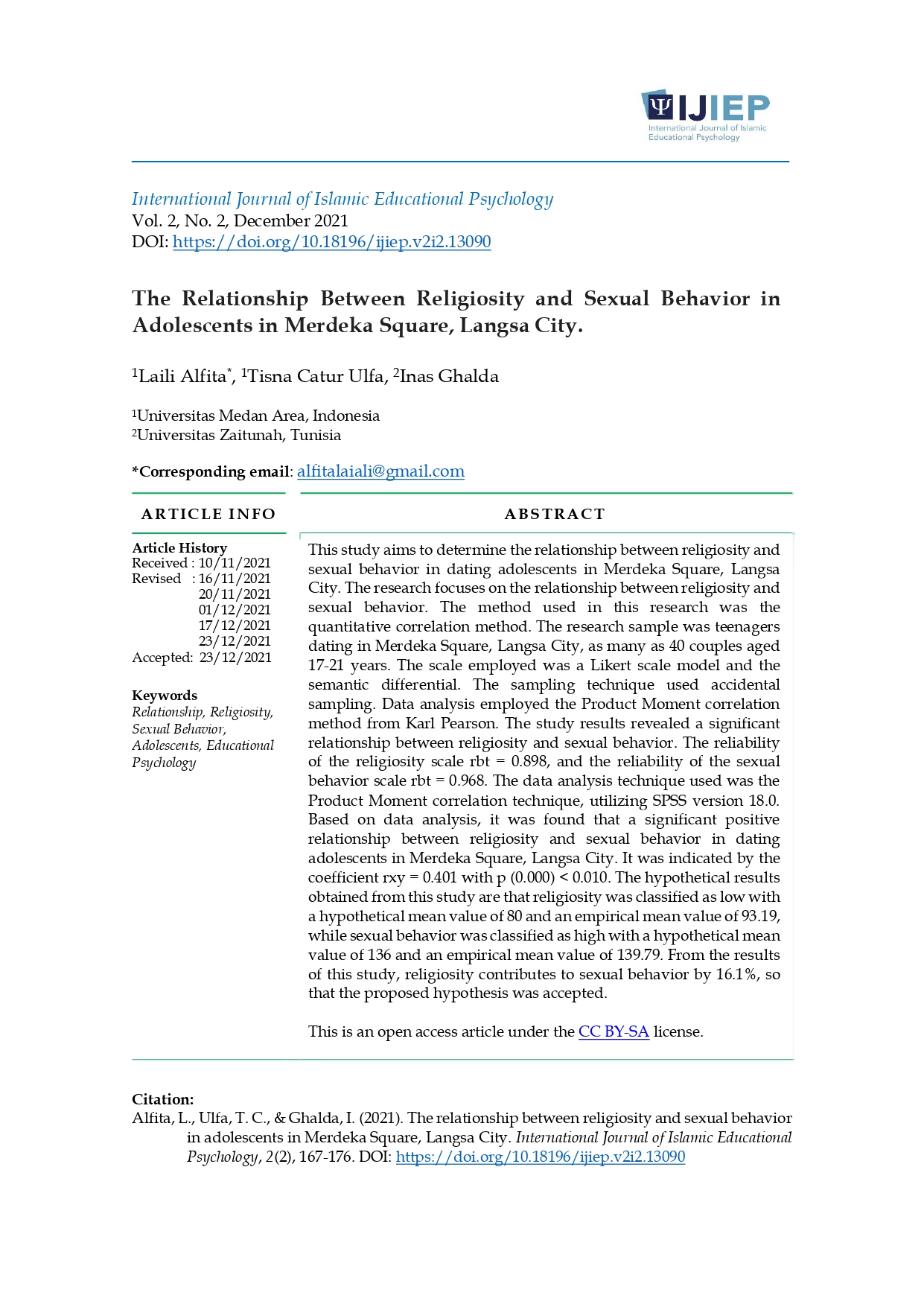The Relationship Between Religiosity and Sexual Behavior in Adolescents in Merdeka Square, Langsa City
DOI:
https://doi.org/10.18196/ijiep.v2i2.13090Keywords:
Relationship, Religiosity, Sexual Behavior, Adolescents, Educational PsychologyAbstract
This study aims to determine the relationship between religiosity and sexual behavior in dating adolescents in Merdeka Square, Langsa City. The research focuses on the relationship between religiosity and sexual behavior. The method used in this research was the quantitative correlation method. The research sample was teenagers dating in Merdeka Square, Langsa City, as many as 40 couples aged 17-21 years. The scale employed was a Likert scale model and the semantic differential. The sampling technique used accidental sampling. Data analysis employed the Product Moment correlation method from Karl Pearson. The study results revealed a significant relationship between religiosity and sexual behavior. The reliability of the religiosity scale rbt = 0.898, and the reliability of the sexual behavior scale rbt = 0.968. The data analysis technique used was the Product Moment correlation technique, utilizing SPSS version 18.0. Based on data analysis, it was found that a significant positive relationship between religiosity and sexual behavior in dating adolescents in Merdeka Square, Langsa City. It was indicated by the coefficient rxy = 0.401 with p (0.000) < 0.010. The hypothetical results obtained from this study are that religiosity was classified as low with a hypothetical mean value of 80 and an empirical mean value of 93.19, while sexual behavior was classified as high with a hypothetical mean value of 136 and an empirical mean value of 139.79. From the results of this study, religiosity contributes to sexual behavior by 16.1%, so that the proposed hypothesis was accepted.
References
Abraham, L., & Kumar, K. A. (1999). Sexual experiences and their correlates among college students in Mumbai City, India. The Indian Journal of Social Work, 62(2), 139-152.
Aridhona, J. (2018). Hubungan prilaku prososial dan religiusitas dengan moral pada remaja. Jurnal Konselor, 7(1), 9-19. https://doi.org/10.24176/perseptual.v2i1.2218
Darroch, J.E., Frost, J.J. & Singh, S. (2001). Teenage sexual and reproductive behavior in develop countries: Can more progress be made?. New York: Allan Guttmacher Institute.
Duvall, E. M & Miller, C. M. (1985). Marriage and family development (6th Ed). New York: Harper & Row Publisher.
El Hafiz, S. (2020). Religiusitas dan moralitas: Teori hukuman tuhan untuk meningkatkan peran agama dalam moralitas. Jurnal Ilmiah Penelitian Psikologi: Kajian Empiris & Non-Empiris, 5(2), 105–112. https://doi.org/10.22236/JIPP-62
Firdaus, V. & Ningsih, Y. T. (2020) Hubungan religiusitas dengan prilaku seksual pada remaja yang berpacaran di Kota Padang. Jurnal Riset Psikologi, 2020(2), 1-11. http://dx.doi.org/10.24036/jrp.v2020i2.8651
Firmansyah, F. A. A. (2020). Peran orang tua dan guru untuk mengembangkan prilaku moral dan religiusitas remaja. Prophetic: Propesional. Empathy and Islamic Counseling Journal, 3(12), 177-186. http://dx.doi.org/10.24235/prophetic.v3i2.7593
Glock, C. Y., & Stark, R. (1965). Religion and society in tension. Chicago: Rand McNally.
Grubbs, J. B., Kraus, S. W., Perry, S. L., Lewczuk, K., & Gola, M. (2020). Moral incongruence and compulsive sexual behavior: Results from cross-sectional interactions and parallel growth curve analyses. Journal of abnormal psychology, 129(3), 266–278. https://doi.org/10.1037/abn0000501
Husaini, I., & Mariyanti, S. (2016). Hubungan antara religiusitas islam dan perilaku seksual pranikah pada mahasiswa Universitas Esa Unggul tahun ajaran 2015/2016. Jurnal Psikologi Media Ilmiah Psikologi, 14(2), 44-52.
Kirana, H. (2015). Gambaran perilaku seks pranikah mahasiswa Universitas Indonesia angkatan 2014-2015. Depok: FKM UI.
Kuncoro, K. (Presenter). (2015, Juni 10). Interview with Kritaya (TAWA). In TAWA [Radio Broadcast]. Radio KPFM 96,8 FM Samarinda.
McKibbin, G., Humphreys, C., & Hamilton, B. (2017). "Talking about child sexual abuse would have helped me": Young people who sexually abused reflect on preventing harmful sexual behavior. Child abuse & neglect, 70, 210–221. https://doi.org/10.1016/j.chiabu.2017.06.017
Merghati-Khoei, E., Atoof, F., Sheikhan, F., Omati, S., Aghajani, N., & Hosseinzadeh, M. (2019). Assessing Iranians' parental competence: Development and psychometric properties of the Children's Sexual Behavior Questionnaire (CSBQ-IR), Iranian Version. Health promotion perspectives, 9(2), 131–136. https://doi.org/10.15171/hpp.2019.18
Muhammad, R. A. (2017). The role of wilayat al-hisbah in the implementation of islamic shariah in Aceh. Petita: Jurnal Kajian Ilmu Hukum dan Syariah, 2(2), 124-133. https://doi.org/10.22373/petita.v2i2.64
Muwaga, M., Nashori, F., & Sholeh, A. (2020). The impact of social environment on the sexual self-regulation of University Students in Uganda. International Journal of Islamic Educational Psychology, 1(2), 75-88. https://doi.org/10.18196/ijiep.v1i2.10011
Papalia, D. E., Olds, S. W., dan Feldman, R. D. (2009). Human development (eleventh edition). New York: McGraw-Hill.
Rifai, R. (2021) Hubungan tingkat religiusitas terhadap kecemasan moral dan alternatif pembinaan moral pada kenakalan siswa. Jurnal Teologi Gracia Deo, 3(2), 76-87. https://doi.org/10.46929/graciadeo.v3i2.63
Rosidah, A. (2012). Religiusitas, harga diri dan prilaku seksual pranikah remaja. Jurnal Psikologi Tabularasa, 7(2), 585-593.
Sarwono. S.W. 2010. Psikologi remaja. Jakarta: Raja Grafindo Persada.
Sugiyono, S. (2003). Metode penelitian. Bandung: Alfabeta.
Sugiyono, S. (2010). Metode penelitian, kuantitatif, kualitatif, dan R&D. Alfabeta Bandung.
Yulianto, Y. (2010). Gambaran sikap siswa smp terhadap perilaku seksual pranikah (penelitian dilakukan di SMPN 159 Jakarta). Jurnal Psikologi Volume 8(2), 46-58.
Yuliva, Y., Yusevni, E., & Azian, V. (2020). Faktor-faktor yang berhubungan dengan perilaku seksual pada remaja di Kota Painan. Jurnal Sehat Mandiri, 15(2), 119-133. https://doi.org/10.33761/jsm.v15i2.318
Zilberman, N., Yadid, G., Efrati, Y., Neumark, Y., & Rassovsky, Y. (2018). Personality profiles of substance and behavioral addictions. Addictive behaviors, 82, 174–181. https://doi.org/10.1016/j.addbeh.2018.03.007

Downloads
Published
How to Cite
Issue
Section
License

- Share — copy and redistribute the material in any medium or format
- Adapt—remix, transform, and build upon the material for any purpose, even commercially.
The licensor cannot revoke these freedoms as long as you follow the license terms. Under the following terms:
- Attribution: You must give appropriate credit, provide a link to the license, and indicate if changes were made. You may do so in any reasonable manner, but not in any way that suggests the licensor endorses you or your use.
- ShareAlike: If you remix, transform, or build upon the material, you must distribute your contributions under the same license as the original.
- No additional restrictions — You may not apply legal terms or technological measures that legally restrict others from doing anything the license permits.






